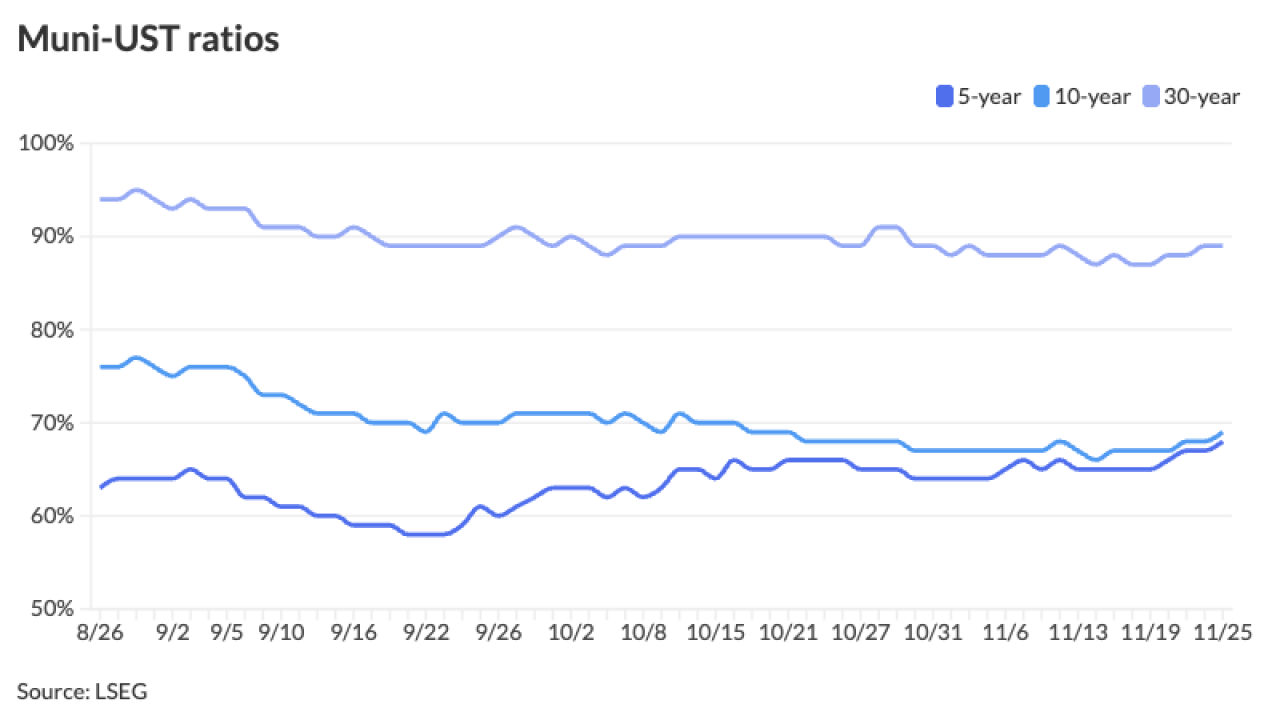
Rhode Island, the nation’s smallest state, has a big problem — unfunded pensions. And it’s not alone.
Gov. Lincoln Chafee and General Treasurer Gina Raimondo implored lawmakers to overhaul the state’s pension system for retirees last week as a special session kicked off in Providence, in the latest tussle nationwide over defined benefit plans for public employees.
Rhode Island’s unfunded pension liability is estimated at $7 billion, up 47% from $4.7 billion in 2009, according to the Washington think tank Pew Center on the States. The amount is about equal to the state’s entire annual budget.
It has also prompted concern from the major bond rating agencies.
“I’m not going to stop talking about it until a bill is passed,” Raimondo said. “The crisis is now. Municipalities can’t balance their budgets now. The state can’t balance next year’s budget now.”
The plan Chafee and Raimondo presented calls for $4 billion in savings; moving most current employees into a hybrid plan that combines a traditional but sharply reduced pension guarantee with a 401(k)-style plan; a retirement age that matches Social Security; and a halt to cost-of-living adjustment, or COLA, raises until the pension plans are about 70% funded.
The Pew Center considers 80% an acceptable threshold.
Lawmakers face a juggling act between taxpayers and public workers. The latter lined the corridors of Rhode Island’s state capitol for last week’s hearings.
“We all want economic prosperity for Rhode Island,” Chafee told the legislature. “However, our $7 billion unfunded pension liability hangs like a cloud over the state — causing uncertainty for economic development, threatening to crowd out state spending on other important government initiatives, and pushing many of our cities and towns to the brink of insolvency.”
Both Chafee and Raimondo took office in January. Chafee was elected governor as an independent, after serving in the U.S. Senate as a moderate Republican. Raimondo is a Democrat.
Chafee and Raimondo are not alone when they say the state must curb pension costs to protect bond ratings and attract businesses.
Bond rating agencies are increasingly vigilant about burdens posed by pension woes.
“The plain truth is that many of our municipal pensions are in far worse shape than the state pension system,” Chafee said, pointing to the abysmal pension funding levels of the Coventry police (16.5%), Cranston police and fire (15.8%), and Smithfield police (11.4%).
Central Falls, which epitomizes Rhode Island’s pension woes, filed for Chapter 9 bankruptcy protection on Aug. 1. The one-square-mile city with only 19,000 residents has an $80 million pension hole. Since its filing, several Rhode Island cities, counties and conduit issuers have received rating downgrades.
In February, Raimondo announced that the Securities and Exchange Commission was investigating Rhode Island’s bond disclosures of its state pension liabilities. The probe was ongoing in August, according to the state’s most recent bond offering documents.
Pension problems resonate elsewhere as well.
In 2007, the Trenton, N.J., think tank Hall Institute for Public Policy issued a report highly critical of New Jersey’s pension system. At the time, executive director Michael Riccards and his colleagues lurked as the skunks at the picnic.
“We took a lot of political heat for it,” Riccards recalled.
The landscape has greatly changed four years and one recession later.
“Now, everyone’s very concerned,” Riccards said at a Hall Institute-sponsored pension forum last month at Rutgers University in Newark that focused on an overhaul the state legislature passed and Gov. Chris Christie signed over the summer.
New Jersey’s sweeping cuts to public worker benefits shifted more pension and health insurance costs to the more than 500,000 employees, moved the retirement age for many workers from 60 to 65, and eliminated cost-of-living increases. It also puts collective bargaining on hold for four years.
“The new changes are more proactive. The question is what do we do now,” said Riccards.
The changes were not enough to prevent Fitch Ratings from lowering New Jersey’s general obligation bond rating in mid-August to AA-minus from AA, affecting $31 billion in appropriation backed-debt and $2.6 billion in GO debt.
Earlier this year, Standard & Poor’s and Moody’s Investors Service downgraded the state.
Standard & Poor’s rates New Jersey’s GOs AA-minus, while Moody’s rates them Aa3.
Fitch analysts pointed to the Garden State in citing the dangers of skipping pension contributions.
According to Richard Raphael, a group managing director for U.S. public finance at Fitch, New Jersey’s bonded debt is 8% of personal income, exceeded only by Massachusetts, Connecticut and Hawaii.
Its OPEB, or other post-employment benefits — such as life insurance and health care premiums, and deferred-compensation arrangements — are among the nation’s highest, he added.
Raphael said pension changes will raise New Jersey’s funding level to 65% from 56%, although he expects that number to drop to 53% by 2018 because of the gradual funding of the actual required contributions.
“When you look at the overall burdens of those long-term liabilities — OPEB, debt and pension — New Jersey ranks among the highest in all three categories. But the real concern is not so much the funding level but rather the gradual funding,” he said.
New Jersey Treasurer Andrew Sidamon-Eristoff, a former New York State tax and finance commissioner and New York City finance commissioner, emphasized flexibility.
“You’ve got to be open to compromise,” he said. “Victory is not a zero-sum game.”
“It’s mind-numbing to try to understand the impact of individual variables,” the treasurer added. “A policymaker must understand how does this contribute to the overall picture.”
A Pew Center report in April said that the recession significantly widened states’ pension and health care funding shortfalls, though its managing director, Susan Urahn, said states dug their own holes long before that.
Urahn, who discussed her report before the Rhode Island General Assembly last month, also warned about a one-size-fits-all approach.
“Data when it comes to pensions is incredibly complicated and difficult when you’re trying to go across the 50 states,” she said at the Rutgers forum.
“It is very challenging to try to make pension-policy legislation looking at single snapshot points in time,” she said. “You wouldn’t want to look at one year of data. You’d want to look at several years of data.”
Jonathan Henes, a New York restructuring partner at law firm Kirkland & Ellis LLP, praised Central Falls for admitting it has a problem.
There, state-appointed receiver Robert Flanders stripped the mayor and City Council of its powers, filed for bankruptcy, then sharply reduced pension benefits for police and fire retirees amid threats of lawsuits.
“Credit Central Falls; they’re dealing with the issue,” Henes said. “When I look at the whole world — cities and states, the federal government, and even Europe — there’s a lot of talk and people then kick the can down the road.
“In Central Falls, they took the bull by the horns and said 'We’re going to fix this city.’ At the end of the day, they’re dealing with the issue. The solutions may be painful, but they’re going about it aggressively.”
Henes expects compromise in Rhode Island.
“There’s a decent chance that this will be resolved through a consensual deal,” he said. “Here’s the issue, if I take a step back: If it were just up to the local unions, there would be a deal, but the national unions will be stepping up because they don’t want to see a precedent set.”
Court decisions could complicate pension matters.
In Rhode Island, Superior Court Judge Sarah Taft-Carter ruled Sept. 14 that the retirement system is essentially “an implied contract” between the state and its employees.
A Pennsylvania Supreme Court ruling last week requires Scranton to pay interest arbitration awards dating from 2003 to 2007 to its police and fire unions.
In doing so, the court said the state’s Act 47 program for distressed communities does not apply to unions under Act 111, which provides for local bargaining rights.
The ruling could tempt some distressed communities to file for bankruptcy instead of enrolling in Act 47, and prompt some state lawmakers to tighten the Act 47 legislation.
Scranton is in Act 47. It is the seat of Lackawanna County, which received a five-notch downgrade from Moody’s last month to a speculative-grade Ba3 from Baa1.





